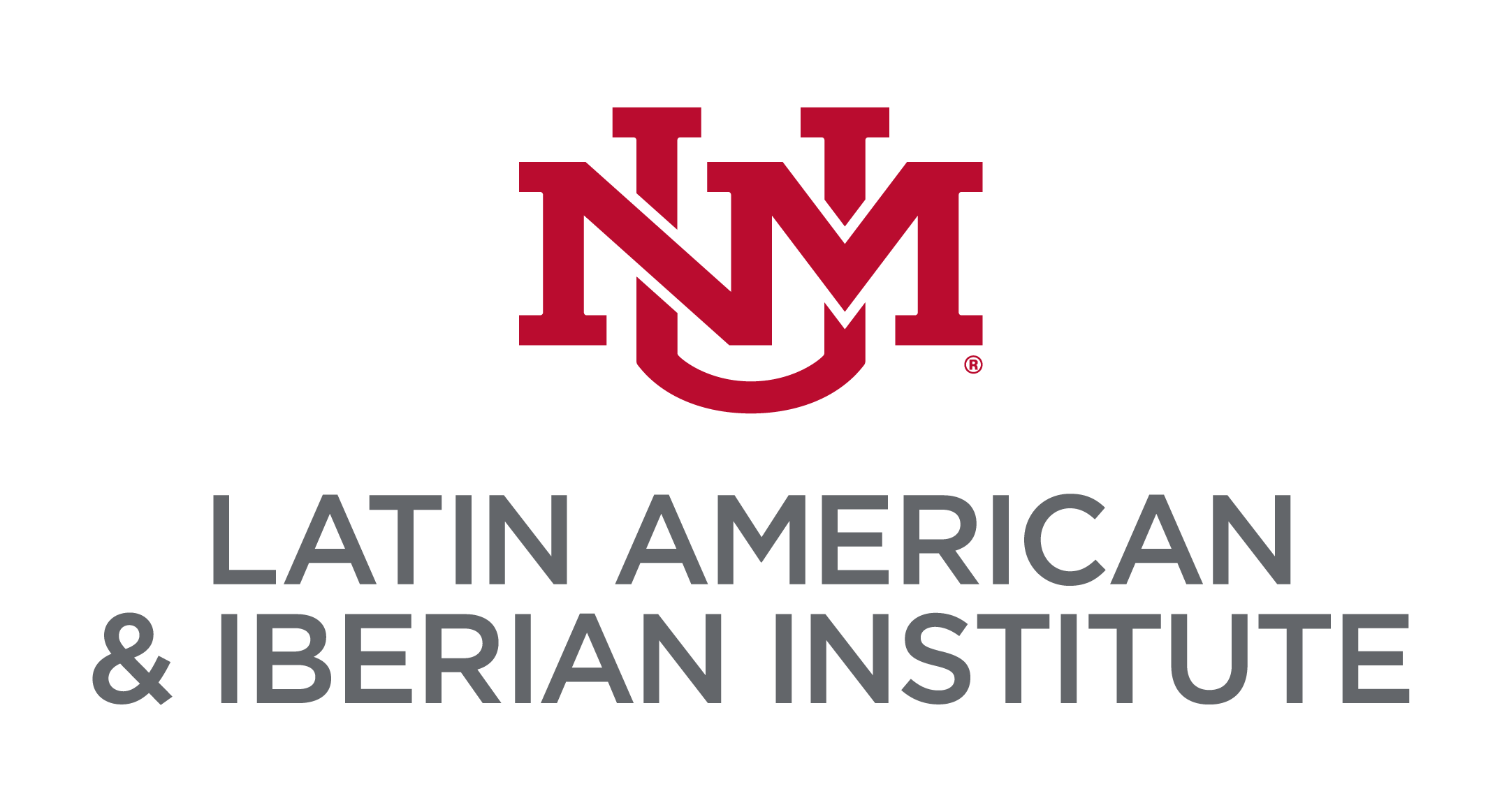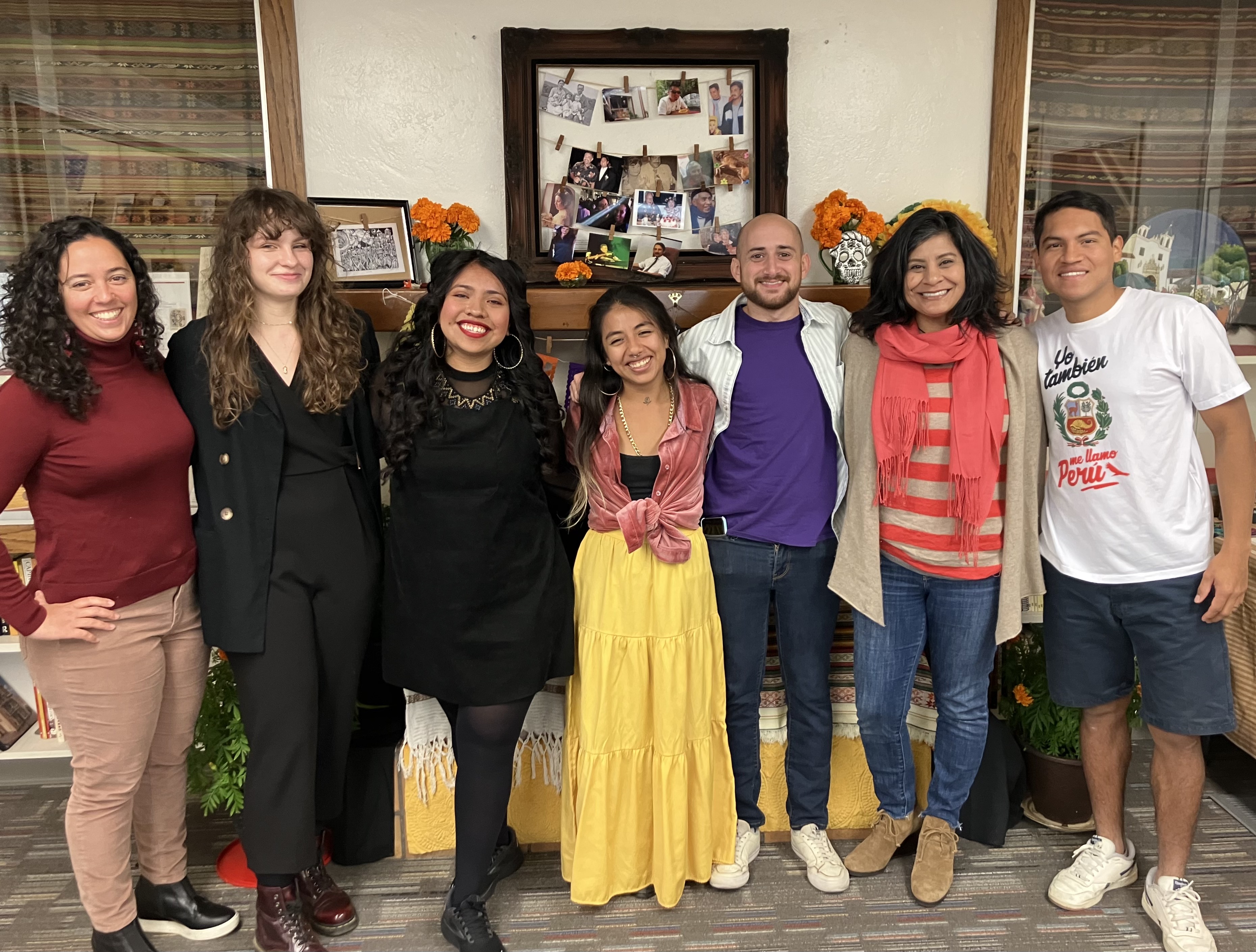Welcoming UNM's 2022-23 Latin American Studies Cohort
November 29, 2022 - Marsella Macias


The University of New Mexico’s Latin American & Iberian Institute welcomed seven new students to its Latin American Studies (LAS) Department this year. The fresh cohort is comprised of students from countries throughout the Americas – Argentina, Brazil, Colombia, México and the United States. Each pupil brings with them knowledge of their homelands, previous global studies experiences, and other extended world travels that offer wide-ranging views and research interests. The diversity of the University of New Mexico and its status as a Hispanic Serving Institution is truly exemplified by this year’s remarkable LAS cohort.
The students are introduced to the field of Latin American Studies by completing a mandatory Pro-Seminar during their first semester. There they become better acquainted with cultural, geopolitical, social, and other discourses surrounding Latin America’s past, present, and future. The course also equips students with knowledge and tools on how to conduct research so that they have promising experiences while engaging with their chosen studies.
You can read more about each student and their areas of study here, but for a more personal look into the students’ experiences this semester, read on to see how each answered the following:
"Has what you have learned in the first half of your Fall 2022 semester led you to new realizations about your chosen areas of study? Additionally, what has been the biggest eye opener for you regarding current coursework affiliated with your chosen concentration?"
Having a little academic background in my chosen area (Indigeneity in the Americas) I have found that the courses I am taking have truly expanded my understanding both artistically and socially of the concept of indigeneity. Initially, I wanted to take a sociolinguistic approach to understanding the Nahuatl language but after reading different books about the discourses of indigenous people in academia or lack of, I decided to shift my focus to examining the narratives of Naua people in colonial Mexico. One book that truly impacted me that we read was Mathew Restall’s Seven Myths of the Spanish Conquest. It planted a seed in investigating what other myths or misinterpretations are circulating in academia pertaining to Naua narratives.
One of the biggest eye-openers for me was learning Nahuatl and the constructions that are important in understanding history and culture. I love learning the importance culture has in the language such that the construction of words is based on philosophical and cultural values. Additionally, one of the most exciting aspects of this semester was reflecting on the overlap of my courses. Seeing how artistically the misrepresentation and syncretism of Mexica and Maya artifacts in comics and contemporary artistic representations match with past constructions of indigeneity is fascinating.
In my first semester of the Master of Arts in Latin American Studies (MALAS) program, I have been challenged and encouraged, and along the way found my viewpoints and research interests shift alongside my exposure to new and vital perspectives. Prior to my MALAS experience, my study experience focusing on Latin America was limited by course availability and my own personal background. I attended a small liberal arts college, and while I credit it with teaching me to think, it ultimately meant my exposure to studying Latin America was limited to research projects throughout various political science courses. Yet, I was always drawn back to protests and social movements in Latin America throughout my courses, and their ability to give a real voice and agency to everyday people. Going into graduate school, I knew that I wanted to continue my studies in a way that was not exploitative, which is why I chose to pursue Latin American Studies over a few International Security Programs to which I was accepted. Coming from a political science background, the perspective shift has at times been jarring but always welcome, and I find myself challenging my own prior biases of examining socio-political issues from a top-down perspective that is quite limited. I am beginning to see how issues work from a bottom up-perspective, and when incorporating that into my research the picture changes significantly. Being taught the language to identify and articulate central issues of class and gender, power discourse, development issues, and hegemonic narratives in my current coursework has been the most enlightening for me. While the shift is difficult, I think I am quite lucky to be in this program and I hope my viewpoints continue to shift as I learn from my professors and fellow cohort.
I started the Master of Arts in Latin American Studies (MALAS) program with the intention to focus on Latin Arts, Literature and Cultural Studies as a continuation with my previous education in photography and passion for cultural expressions like the Congado, a religious folkloric tradition in the state of Minas Gerais, Brazil. However, the topics I was introduced to this semester such as inclusion, the right to the city, and the framework of race and ethnicity in colonized communities has further clarified a personal interest to explore a concentration in Environmental Governance and Resilience focusing on the Krenak indigenous community and their struggle for land and human rights. I intend to study the political, social, and environmental issues the Krenak community is currently facing and would like to participate in giving a scholarly voice to these struggles.
Thanks to the classes I am taking, I have learned much about the more practical aspects of research, be it ethnographic, historical, or experiential. I have realized the need for a concrete focus on my topics of interest, and especially being passionate and interested in what I do. I have been able to connect my own interests with my research interests, and that is giving me renewed energy.
In terms of classes, I am very glad to be in classes where we get to interact with scholars from different areas. Moreover, the expertise of the professors themselves is a great resource, and sharing spaces of feedback, discussion and support has been a key aspect of my time here at LAS.
The biggest eye opener during my first semester was coming to the realization that my previous visits to México (dates ranging from 2012-2020) to explore agave- and mezcal-producing regions, unbeknownst to me then, incorporated various research methods that I’m currently studying in my Pro-Seminar and Globalization & Development classes.
Although I didn’t have the academic-centric acumen to describe what I was learning about while venturing throughout México at the time, my current classes covering in-depth discourses on race, ethnicity, ethnography, development, and globalization – have offered me an improved understanding of academic research methods and vocabulary. My near-future plans include returning to México for more first-hand learning from agave- and mezcal-producing communities. I will aim to observe, interact, and document information that more closely reflects the lived experiences, attitudes, and future desires of producing communities. My work aims to collectively and impactfully support futures for agave farmers, mezcal producers, and agave culture's integrity and sustained ecological biodiversity.
During the first part of the fall semester I discovered new perspectives of authors on various ways of organization and the evolution of social groups' participation in Latin America. The Globalization and Development course given by the department of Geography and Environmental Studies allowed me to broaden my knowledge about discourses and reflections around the policies and ideologies of development that have been implemented throughout Latin America.
This same course leaves me with the reflection that we must not continue coining sub-terms to refer to the development of social groups or other entities. What we must look for are development alternatives, that is, effective and beneficial development strategies for society and the environment.
To preface, I came into my MALAS career with undergraduate foci on U.S. labor movements, protest, and Latin American migration. A passionate labor organizer, I knew my vision for my studies entailed all this, and more. But what I didn’t count on was the influence my classes would have on me - where I was able to engage with professors who have similar and differing perspectives; hearing from my cohorts on their ample experiences and disciplines; and the windows LAII open within my career, be it through Field Research Grants or the events hosted by the institute.
The biggest epiphany I’ve experienced so far is the understanding that history is being written in the present. I have decided to delve into the field of cannabis in Latin America because, as my Globalization & Development course has shown me, we need scholars with cultural & historical empathetic understanding at the table, instead of the continual blanket enforcement of western modernity within unique communities that refuse to fit uniformly within policies dictated by imperialism. With my communities’ support behind me, I aim for my career to serve history and policies that serve el pueblo, instead of corporate greed.
